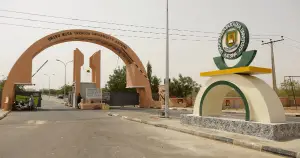The Director General of the Nigerian Automotive Design and Development Council (NADDC), Mr. Oluwemimo Osanipin, has announced the selection of twelve Nigerian universities to design and produce electric shuttle buses.
Speaking during a stakeholders engagement in Uyo, Akwa Ibom State on Wednesday, Osanipin revealed that two universities from each of the six geopolitical zones have been chosen to participate in this groundbreaking initiative.
Locally Designed and Sourced
"We have started an initiative where we have gathered twelve universities, two from each geopolitical zone. They are designing what we call the university shuttle bus that is going to be electric 100%," Osanipin stated.
The NADDC Director General emphasized that the buses will be entirely designed in Nigeria with most components sourced locally, showcasing the country's growing capacity for indigenous technological innovation.
"It is going to be designed in Nigeria; most of the parts are going to be sourced locally. So, they are on it, when they are done, we will come together again with assemblers, auto-vehicle manufacturers and with some companies that can finance the project like the Bank of Industry and other financial institutions. Then we will be able to produce these vehicles," he explained.
Industry Regulation and Stakeholder Involvement
During the engagement, Osanipin urged stakeholders in the automotive industry to embrace regulation to ensure vehicle safety and environmental standards across the country.
The National President of Automotive Dealers of Nigeria, Engr. Ajibola Adedoyin, highlighted the benefits of a regulatory framework, including enhanced security and increased revenue generation.
"The nation stands to gain a lot. We feel it's wrong for anybody to import a vehicle into the country without going through a registered dealer so that in case of anything, it could be traced," Adedoyin remarked.
He further emphasized the security implications: "Even in the area of security, it matters a lot because most of the atrocities are committed with vehicles. So apart from revenue lost and making work easier for the industry and government, it still gives room for a large percentage of security threats to be curtailed."
Adedoyin also called on the government to refine policies to make vehicles more affordable and accessible to Nigerians, stating, "The government has to finetune the policy to make vehicles affordable and accessible."
This initiative represents a significant step toward sustainable transportation in Nigeria's education sector while promoting local content development and technological advancement in the automotive industry.













